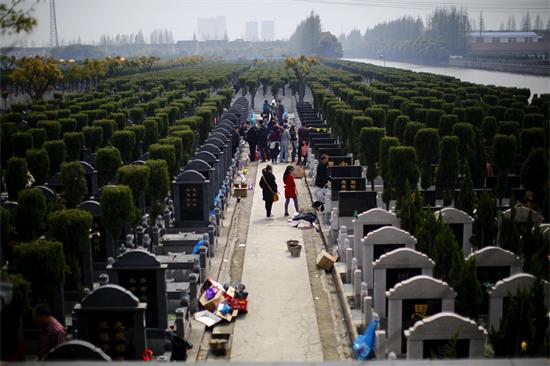More ways to pay respect to the dead
(China Daily) Updated: 2016-04-05 07:46
 |
|
People visit the tombstones of deceased relatives during Qingming Festival, or Tomb Sweeping Day, at Songhe cemetery on the outskirts of Shanghai April 5, 2014. [Photo/Agencies] |
A woman, who works in Beijing, couldn't return to Kunming, capital of Yunnan province in Southwest China, to sweep her parents' tombs. She hoped to find a tomb-sweeping service to do it for her but failed. Public cemeteries in the city have stopped the service for some time because there was little demand. Beijing Youth Daily commented on Monday:
When companies offering tomb-sweeping services first emerged, they initially drew attention because of their novelty. However, there was more criticism than praise for them, and most of them soon went out of business as few people wanted to use such services.
This is a good thing in terms of preserving the tradition of tomb-sweeping, as commercializing the tending of graves and hiring strangers to show respect to the deceased do not honor their memory.
If the woman from Kunming couldn't make it home to sweep her parents' tomb herself because of her business commitments, she could hold a memorial ceremony at home to express her love and gratitude. She does not have to travel to her parents' graves to remember them.
The rituals of tomb-sweeping, whether simple or sophisticated, are intended to be a way to remember our ancestors.
But all in all, the traditional rituals of tomb-sweeping are merely a formality, many young people memorialize the deceased online nowadays and people can honor the spirits in the way that suits them best.
- Over 13m Chinese honor deceased during Tomb-Sweeping holiday
- Flowers, yellow ribbons and sea burials in Tomb-Sweeping holiday
- Beijing promotes eco-friendly burials ahead of Tomb-Sweeping Day
- Qingming (Tomb-sweeping) Festival
- Over a million celebrate Tomb Sweeping Festival in Gansu
- Tomb-Sweeping Day holiday sees 4.17 million tourists in Shanxi
- Hanfu-clad residents mark Tomb Sweeping Day in Gansu
- Fangchenggang North Station sees more passengers during Tomb-sweeping Festival
- 13 mountain fires on first day of Tomb-sweeping Festival

I’ve lived in China for quite a considerable time including my graduate school years, travelled and worked in a few cities and still choose my destination taking into consideration the density of smog or PM2.5 particulate matter in the region.










